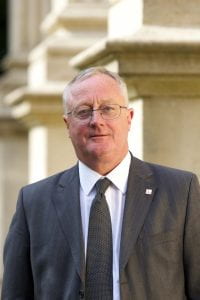Professor Sir Eric Thomas FMedSci, former Vice-Chancellor and President at the University of Bristol, sadly passed away on Friday 10 November 2023 aged 70, following a short battle with cancer. He was Bristol’s 12th Vice-Chancellor, and led the University for 14 years between 2001 and 2015 during a period of significant change in higher education.

During his time at Bristol, Sir Eric was President of Universities UK from 2011 to 2013, a founder member and President of the Worldwide Universities Network for four years, and received a knighthood in the Queen’s Birthday Honours 2013 for services to higher education. The Thomas Report of 2004, written by Sir Eric, also provided a road map for advancement and philanthropy to flourish in the UK.
Sir Eric was born in Hartlepool in 1953 and was a Geordie through-and-through. His grandfather was a miner, and his early years in the north-east shaped his views and values – and his love of football. He initially took arts A-levels, in defiance of his father, a GP, who wanted him to become a doctor. After realising his mistake, he then took science A-levels in a year.
He graduated in Medicine from the University of Newcastle-upon-Tyne in 1976, and married his wife, Narell, the same year. He chose obstetrics and gynaecology as his specialism once he became a doctor, and was particularly interested in infertility and the biology of endometriosis, publishing over 150 papers.
He was a Lecturer at the University of Sheffield and a Senior Lecturer at the University of Newcastle before being appointed Professor of Obstetrics and Gynaecology at the University of Southampton in 1991. In the same year, he became a Consultant Obstetrician and Gynaecologist at Southampton University Hospitals Trust. At the age of 42, Sir Eric became Head of the School of Medicine at Southampton and was appointed Dean just three years later. From there, he came to Bristol as Vice-Chancellor in September 2001.
He joined this University with a vision of how he wanted it to be – academically excellent in teaching and research, attracting the best students and the best staff, and making an impact on the international stage. His focus on teaching, and the establishment of clear career pathways for academics who wished to focus their efforts on teaching, was revolutionary for Bristol and it led to a great experience for our students.
Research at Bristol was also more ambitious and outward facing, enterprising, multidisciplinary and delivering high impact. This was reflected in the Research Excellence Framework (2014).
During his time at Bristol, some of the things he helped oversee included: massive investment in people, buildings and the student experience based on a successful financial strategy; a leap forward in terms of philanthropic funding including the Centenary Campaign that passed the £100 million fundraising target six months ahead of schedule (to which he personally contributed at a very generous level); an increase in student numbers to strengthen some of our smaller departments; and a new sense of partnership with the City of Bristol, recognising that the city is important to the success of the University and the University helps the city to succeed.
Sir Eric also helped put the University of Bristol on the international map. We are now consistently placed well within the top 100 global universities and have a diverse student and academic population.
Jack Boyer, Chair of the Board of Trustees, said: “We are incredibly saddened to hear this news; Sir Eric was one of the architects in shaping the future of higher education. He was a great advocate of both the University and city, and helped champion educational philanthropy, internationalisation, the commercial exploitation of innovation, as well as raising educational standards through a partnership with Bristol schools”.
Evelyn Welch, Vice-Chancellor and President, who has been a friend of Eric’s for 15 years since she was Pro Vice-Chancellor for Research at Queen Mary University of London, added: “Sir Eric had three outstanding qualities – vision, leadership and commitment, and knew exactly where he wanted to take the University, and during his 14-year career at the helm he had the leadership skills to take it there.
“He will be remembered fondly for all his achievements while at Bristol that helped not only those in the local community but also across the world. Our thoughts are with his wife Narell, his children Rachel and David and the wider family at this very sad time.”
